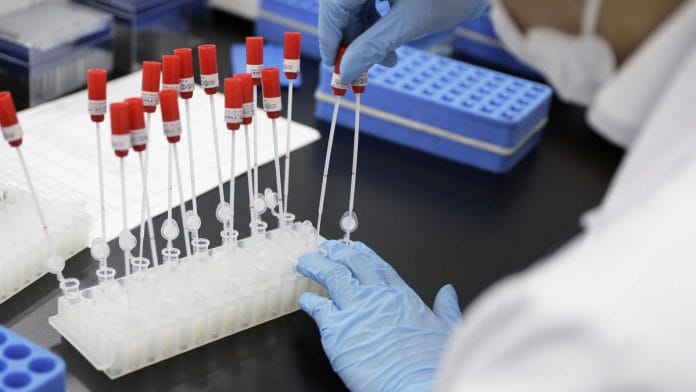New Delhi: A Bengaluru firm claims to have developed the first DNA-based test to detect drug-resistant tuberculosis (TB) causing bacteria. The new DNA test will enable quick diagnosis and accurate treatment, says MedGeneome Labs, a genetic diagnostics and drug discovery research company.
There are over 1.5 lakh multi-drug resistant (MDR) TB patients in India.
Named ‘Spit Seq’, the diagnostic tool is the first test based on ‘whole genome sequencing’ that can provide a detailed analysis of every single mutation present in any TB causing bacteria directly from the sputum, the company claims.
Genome sequencing is a reading of the complete DNA sequence of an organism that allows doctors to have a microscopic view of the genes and characteristics, which also reveal insights on better ways to kill or stop its growth.
With several scientists also studying genome sequencing to find a cure for cancer, the test for TB will enable doctors to identify the appropriate drugs and treatment protocol of patients against the present method of hit and trial.
“Spit Seq is a massive breakthrough that can help millions. This particular test not only brings accurate results but also saves a lot of time where TB treatment is concerned,” Dr V.L. Ramprasad, chief operating officer at MedGenome Labs, said in a press statement. “In lines with India’s objective to counter TB effectively and quickly, we aim to benefit the last person living with TB today.”
According to the World Health Organization (WHO), multidrug-resistant TB (MDR-TB) remains a public health crisis and a health security threat across the globe. “The MDR-TB burden largely falls on three countries — India, China and the Russian Federation — which together account for nearly half of the global cases,” it says.
In India, an estimated 4.8 lakh patients die of TB every year, of whom over 1.5 lakh suffer from MDR-TB, according to government data.
Also read: Here’s how nanomedicine can revolutionise the way we treat tuberculosis
How does the test work?
The test is based on whole-genome sequencing of mycobacterium tuberculosis (MTB) — the TB causing bacteria — to assess the mutations in the bacteria’s genome, which would help a doctor zero in on a drug that will work.
At present, doctors rely on a culture growth test to detect MTB but that takes over a month. This is because as slow-growing bacteria, MTB takes six to eight weeks for culture growth, which delays not only TB diagnosis but also drug resistance testing.
The culture growth test is conducted in a laboratory that grows bacteria by providing it similar conditions and growth possibilities that are inside the body. By the time results arrive, however, the actual state of the patient’s body could be different or even worse.
The new technology removes the requirement of conducting a culture growth test.
The company claims that “the test has been validated with over 100 samples where it recorded with 100 per cent sensitivity and 98.04 per cent specificity when compared with Line Probe Assay (LPA)”.
Half of these samples were provided in association with the P.D. Hinduja Hospital and Medical Research Centre, Mumbai, it said in the press statement.
A technological breakthrough
The latest technology is likely to show test results in less than two weeks if the company is to be believed. “Direct whole-genome sequencing reveals information on drug resistance mutations for all anti TB drugs in a matter of 10 days. Soon, this technology will help in optimising the precise management of an MDR-TB patient,” said Dr Camilla Rodriques, P.D. Hinduja Hospital and Medical Research Centre, Mumbai, during the launch of the technology.
Rodriques’s comment was included in the press statement released by the company Thursday.
Also read: What it will take to finally defeat Tuberculosis






